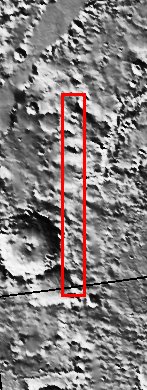
Released 3 December 2003
An unusual mix of orange and gray hues are on display in this approximately true colorTHEMIS VIS image. Using the pixel-averaging mode of the camera to allow for increased coverage (at lower spatial resolution), the scene spans over 190 km of the region known as Nili Fossae in NE Syrtis Major. Note how the orange hues tend to occur on upland terrain while the gray hues are mostly on the lowlands. This may be due to the action of gray, basaltic sand moving along the lowland terrain and scouring away the oxidized or weathered orange-brown surfaces.
Initial image processing and calibration by THEMIS team members J. Bell, T. McConnochie, and D. Savransky at Cornell University; additional processing and final color balance by space artist Don Davis.
Image information: VIS instrument. Latitude 21.4, Longitude 76.6 East (283.4 West). 19 meter/pixel resolution.
Note: this THEMIS visual image has not been radiometrically nor geometrically calibrated for this preliminary release. An empirical correction has been performed to remove instrumental effects. A linear shift has been applied in the cross-track and down-track direction to approximate spacecraft and planetary motion. Fully calibrated and geometrically projected images will be released through the Planetary Data System in accordance with Project policies at a later time.
NASA's Jet Propulsion Laboratory manages the 2001 Mars Odyssey mission for NASA's Office of Space Science, Washington, D.C. The Thermal Emission Imaging System (THEMIS) was developed by Arizona State University, Tempe, in collaboration with Raytheon Santa Barbara Remote Sensing. The THEMIS investigation is led by Dr. Philip Christensen at Arizona State University. Lockheed Martin Astronautics, Denver, is the prime contractor for the Odyssey project, and developed and built the orbiter. Mission operations are conducted jointly from Lockheed Martin and from JPL, a division of the California Institute of Technology in Pasadena.

